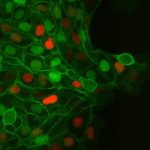All multicellular organisms are formed from a single cell, the zygote. To develop various organs and tissues, this original cell multiplies until there is a functional, adult organism. This process of multiplication is called cell division.
Each cell of an organism divides about 50 times before dying off. To divide, the cell must grow, copy its genetic material (DNA), and physically divide into two ‘daughter cells’ equal to each other and equal to the mother cell; this is the so-called ‘cell cycle’. The two daughter cells, in turn, can follow the same cycle and multiply their offspring exponentially in the following generations.
Both in the early stages of embryonic development and in adult organs and tissues, cell divisions must be regulated. Cancer is an example of what happens when uncontrolled cell proliferation occurs. Cancer cells divide indefinitely to form tumors and even invade and interfere with the proper functioning of healthy tissues and organs. It is therefore crucial to understand what mechanisms regulate cell division in the adult organism and in its development.

Prof. Trepat’s research team has discovered that mechanical forces regulate various phases of the cell cycle, including the onset of mitosis, when the nucleus and cytoplasm are divided into two cells. The researchers saw that the tension and mechanical energy of a tissue can predict the duration of the phases of the cycle. This means that it could be a possible mechanism to control cell division and homeostasis – that is, the self-regulation mechanisms found in living beings.
To reach this conclusion, the researchers measured the mechanical forces exerted by hundreds of cells during cell division, as well as the influence of their neighbors, in experiments lasting more than 24 hours. “We found a clear correlation between the mechanical state of the tissue and the cell divisions that occur in it,” says Marina Uroz, a PhD student in Prof. Trepat’s group and first author of the study. “Among other things, we have seen that cells lower their tension level just before dividing to facilitate the process of mitosis. In addition, neighboring cells collaborate in this process before and during division.”
The study suggests that mechanical forces can regulate cell divisions in tissues, which could play an important role in understanding cancer. “We were already well aware of the genetic programs and biochemical signals that regulate cell division, but with this study we have shown that physical forces also play a role,” says Prof. Trepat. “If we could stop the uncontrolled division of cancer cells using mechanical signals, we would avoid the growth of tumors and the spread of cancer.”
The research was financed by the Generalitat de Catalunya, the Ministry of Economy and Competitiveness (MEC), the Ministry of Health (CIBER-BBN program) and the European Research Council (TensionControl project), as well as the European Commission, Obra Social la Caixa and the La Marató Foundation of TV3.
—
Article: Marina Uroz, Sabrina Wistorf, Xavier Serra-Picamal, Vito Conte, Marta Sales-Pardo, Pere Roca-Cusachs, Roger Guimera & Xavier Trepat. “Regulation of cell cycle progression by cell–cell and cell–matrix forces”. Nature Cell Biology, 25 May 2018. Doi:10.1038/s41556-018-0107-2
—
IBEC in the Media:
http://noticiasdelaciencia.com/not/28756/las-fuerzas-fisicas-regulan-la-division-celular





